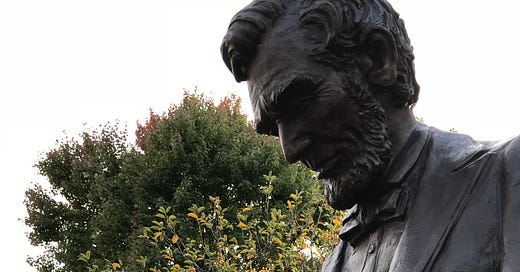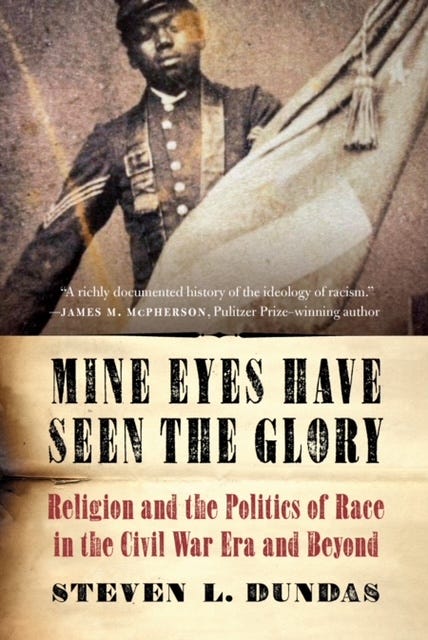Our Democracy is Under Attack and Worth Fighting to Preserve and Improve
Combating the Right Wing Idea that Liberty is for the Few
The proposition that our democracy is worth fighting and even dying for matters to me, and hopefully to you as well.
The title of this site is Dedicated to the Proposition that All Men are Created Equal. It is from Abraham Lincoln’s Gettysburg Address, given at the height of the Civil War in which he reached back, and to a people divided by secession, scarred by war, and discouraged by the problems of a divided democracy. Given at the site of the largest battle ever fought on American soil, and at the place the fallen Union defenders were still being interred, Lincoln, invited to make a few brief remarks following an address by the great orator, Edmund Everett, spoke these immortal words:
Four score and seven years ago our fathers brought forth on this continent, a new nation, conceived in Liberty, and dedicated to the proposition that all men are created equal.
Now we are engaged in a great civil war, testing whether that nation, or any nation so conceived and so dedicated, can long endure. We are met on a great battle-field of that war. We have come to dedicate a portion of that field, as a final resting place for those who here gave their lives that that nation might live. It is altogether fitting and proper that we should do this.
But, in a larger sense, we cannot dedicate — we can not consecrate — we can not hallow — this ground. The brave men, living and dead, who struggled here, have consecrated it, far above our poor power to add or detract. The world will little note, nor long remember what we say here, but it can never forget what they did here. It is for us the living, rather, to be dedicated here to the unfinished work which they who fought here have thus far so nobly advanced. It is rather for us to be here dedicated to the great task remaining before us — that from these honored dead we take increased devotion to that cause for which they gave the last full measure of devotion — that we here highly resolve that these dead shall not have died in vain — that this nation, under God, shall have a new birth of freedom — and that government of the people, by the people, for the people, shall not perish from the earth.
Lincoln’s words appealed to the Declaration, something despised by the proponents of slavery and the instigators of secession, long before the the first shot was fired at Fort Sumter. George Fitzhugh was one of the apostle’s of slavery and disunion. He despised the Declaration and the Bill of Rights. Fitzhugh’s stated premise was “Liberty for the few – slavery in every form, for the mass.” He wrote:
“We conclude that about nineteen out of twenty individuals have “a natural and inalienable right” to be taken care of and protected, to have guardians, trustees, husbands or masters; in other words they have a natural and inalienable right to be slaves. The one in twenty are clearly born or educated in some way fitted for command and liberty.”
The words are Orwellian. It is a twisted and evil way to describe liberty, and Lincoln noted it, saying, We all declare for liberty” but “in using the same word we do not all mean the same thing. With some the word liberty may mean for each man to do as he pleases with himself and the product of his labor; while with others the same word may mean for some men to do as they please with other men and the product of other men’s labor.”
I find this interesting because former President Donald Trump has more than once broached the idea of eliminating the Constitution, as well as laws and institutions that serve as the guardrails of the Republic and our democracy. Likewise, he and his supporters attempted to overthrow our government by violently attacking Congress in its ceremonial duty of counting the votes of the Electoral College, in order that he might remain in power despite having lost the election. Now under indictment in New York, with other possible indictments pending, he is again threatening violence and telling his followers that he “is their retribution,” while making threats against elected and appointed officials carrying out the duties of their offices.
Around the country elected officials of his Party are working to gerrymander elections, limit and roll back the Constitutional voting rights and civil rights of African Americans, other minority and immigrant communities, women, and LGBTQ+ people. Additionally, armed militias and members of groups considered domestic terrorist groups menace them online and in person, often working with supportive politicians.
Fitzhugh would have agreed with their actions. He despised the Declaration and Bill of Rights, writing:
“We must combat the doctrines of natural liberty and human equality, and the social contract as taught by Locke and the American sages of 1776. Under the spell of Locke and the Enlightenment, Jefferson and other misguided patriots ruined the splendid political edifice they erected by espousing dangerous abstractions – the crazy notions of liberty and equality that they wrote into the Declaration of Independence and the Virginia Bill of Rights. No wonder the abolitionists loved to quote the Declaration of Independence! Its precepts are wholly at war with slavery and equally at war with all government, all subordination, all order. It is full if mendacity and error. Consider its verbose, newborn, false and unmeaning preamble…. There is, finally, no such thing as inalienable rights. Life and liberty are not inalienable…. Jefferson in sum, was the architect of ruin, the inaugurator of anarchy. As his Declaration of Independence Stands, it deserves the appropriate epithets which Major Lee somewhere applies to the thought of Mr. Jefferson, it is “exuberantly false, and absurdly fallacious.”
Lincoln understood the Declaration as something more than a document, but as something transcending even our country. His words echo the Transcendentalist understanding of the Declaration of Independence as a “test for all other things.”
Lincoln’s words at Gettysburg channeled the ideas of the Unitarian Pastor and abolitionist, Theodore Parker, who wrote: “The bill of rights which it promulgates is of rights that are older than human institutions, and spring from the eternal justice…. The heart of Jefferson in writing the Declaration, and of Congress in adopting it, beat for all humanity; the assertion of right was made for the entire world of mankind and all coming generations, without any exceptions whatsoever.”
His words are important for us today. The eminent historian Allen Guelzo noted something that is extremely important, and we would be wise to heed his words:
“The genius of the address thus lay not in its language or in its brevity (virtues though these were), but in the new birth it gave to those who had become discouraged and wearied by democracy’s follies, and in the reminder that democracy’s survival rested ultimately in the hands of citizens who saw something in democracy worth dying for. We could use that reminder again today.”
I believe that there is something in our democracy’s survival, that is worth defending and even dying for, in order that in the words of Daniel Webster, which Lincoln appropriated to hammer home his message at Gettysburg, “that government of the people, by the people, for the people, shall not perish from the earth.”
Almost forty years ago I first swore the sacred oath of office to support and defend the Constitution of the United States against all enemies, foreign and domestic. That oath still guides my life.
Have a great week.
Please note: All citations for the quotes in this article can be found in my book “Mine Eyes Have Seen the Glory: Religion and the Politics of Race in the Civil War Era and Beyond.”





